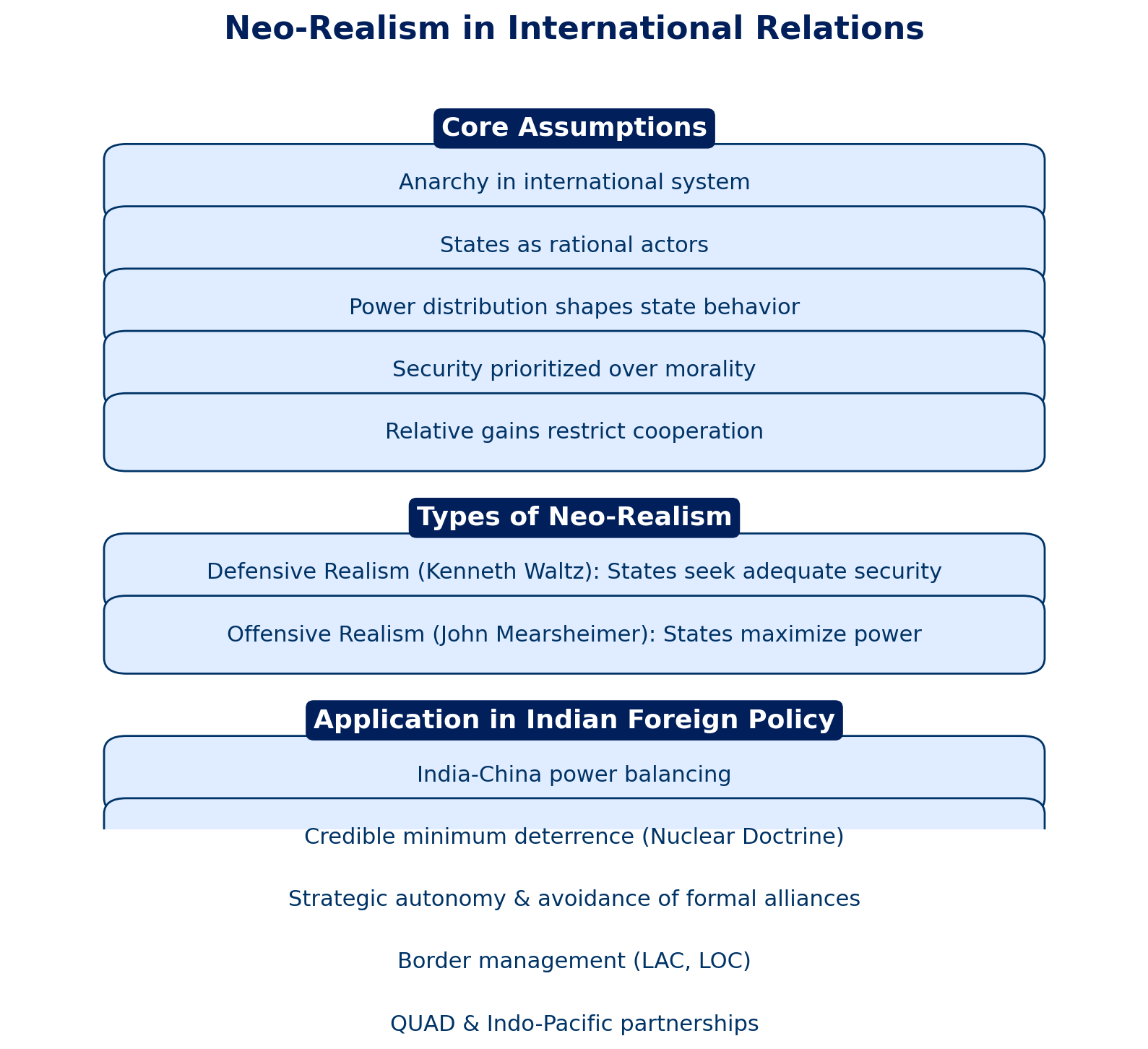
19 Jul Neo-Realism in International Relations
Neo-Realism in International Relations: A Critical IR Theory for UPSC CSE
Neo-Realism, also called Structural Realism, is a dominant theory in International Relations (IR) that builds upon the classical ideas of Realism but introduces a structural explanation for state behavior. This theory is highly relevant for UPSC Civil Services aspirants, especially for GS Paper 2, as it provides a realistic understanding of how the international system operates and why states pursue power and security within an anarchic global order.
What is Neo-Realism?
Neo-Realism, pioneered by Kenneth Waltz in his seminal work “Theory of International Politics” (1979), argues that the structure of the international system determines state behavior, not human nature as Classical Realists believed. It is a more scientific and structural approach to understanding global politics.
Core Assumptions of Neo-Realism
- Anarchy: The international system lacks a central authority, creating a self-help system.
- Structure Matters: State behavior is shaped by the distribution of power (polarity).
- States are Rational Actors: They seek to survive and maximize relative power.
- Security is the Priority: States prioritize survival over morality or cooperation.
- Relative Gains: Cooperation is limited because states fear others gaining more.
Types of Neo-Realism
- Defensive Realism (Kenneth Waltz): States aim for enough power to ensure security but avoid over-expansion.
- Offensive Realism (John Mearsheimer): States seek to maximize power and become regional hegemons to ensure survival.
Neo-Realism vs Classical Realism
| Aspect | Classical Realism | Neo-Realism |
|---|---|---|
| Cause of Conflict | Human nature (greed, ego, fear) | International system (anarchy, polarity) |
| Key Proponent | Hans Morgenthau | Kenneth Waltz |
| Focus | Morality, diplomacy, balance of power | Structure, polarity, power distribution |
| Nature of States | Driven by fear and ambition | Rational actors seeking survival |
Relevance of Neo-Realism in Indian Context
- India-China Rivalry: Power balancing in the Indo-Pacific reflects Neo-Realist competition.
- Nuclear Doctrine: India’s doctrine of credible minimum deterrence is rooted in realist ideas.
- Strategic Autonomy: India avoids alliances to protect sovereignty in an anarchic system.
- Border Conflicts: Realist logic explains recurring tensions with neighbors like Pakistan and China.
- Quad and Indo-Pacific: Security partnerships without formal alliances indicate strategic balancing.
Criticism of Neo-Realism
- Ignores domestic politics and regime types (unlike Liberalism).
- Underestimates cooperation and global norms.
- Too pessimistic—fails to explain peace in some regions.
- Does not account for transnational actors (NGOs, MNCs).
- Fails to explain economic interdependence and institutions.
UPSC Mains Previous Year Questions Related to Neo-Realism
- 2022: Evaluate India’s role in Indo-Pacific power realignment.
- 2020: How realistic is India’s strategic autonomy in a polarized world?
- 2018: Discuss India’s nuclear strategy in view of shifting geopolitical equations.
- 2015: Analyze the challenges of multipolarity in maintaining peace.
Probable UPSC Questions on Neo-Realism
- Discuss the core assumptions of Neo-Realism and their relevance to India’s foreign policy.
- Compare and contrast Classical Realism and Neo-Realism with examples from Indian diplomacy.
- How does Neo-Realism explain the changing power dynamics in the Indo-Pacific region?
- Critically evaluate the limits of Neo-Realism in explaining global cooperation on climate change.
Conclusion
Neo-Realism remains one of the most influential theories in global politics and offers crucial insights into India’s strategic behavior in a complex world. While it may not account for every facet of diplomacy and cooperation, it explains the strategic compulsions of states in an anarchic global order. For UPSC aspirants, understanding Neo-Realism not only strengthens conceptual clarity but also enhances GS2 and Essay paper performance.
Keywords: Neo-Realism, Structural Realism, Kenneth Waltz, Realism vs Neo-Realism, IR theories UPSC, Indo-Pacific power politics




No Comments